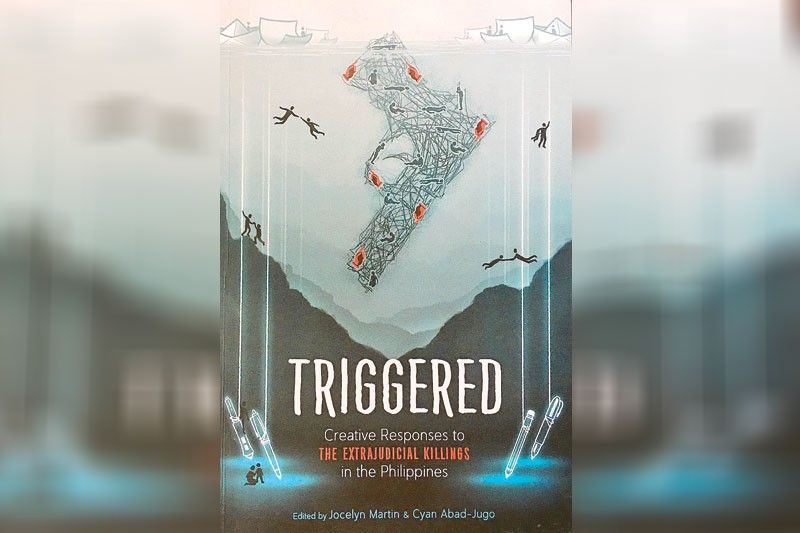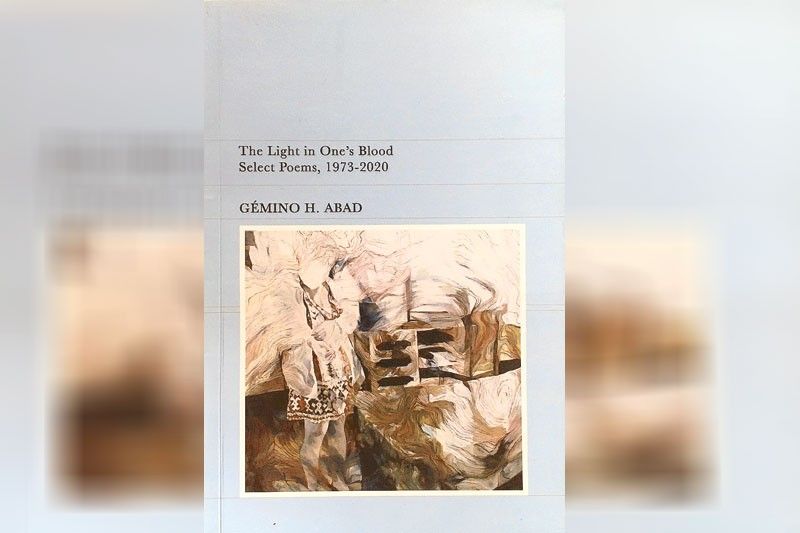Merging works, mastering words


These two books could have joined the list of must-have titles I wrote up at yearend, but deliveries were delayed. Well and good, as now they get more promotional space each.
Triggered: Creative Responses to the EJKs in the Philippines, co-edited by Jocelyn Martin and Cyan Abad-Jugo, published by Chamber Shell Publishing, had a Zoom launch last Nov. 27.
In 2017, college professor Jocelyn Martin, a trauma and memory studies scholar, invited her freshmen English classes in Ateneo to write fiction about the issue of extrajudicial killings in the Philippines. Six of the best stories were chosen for possible publication in an anthology. Her fellow teacher Cyan Abad-Jugo asked professional writers to mentor these students in polishing their stories and in processing the complex issue, all while contributing their own written pieces in response.
As the back-cover blurb heralds: “Six students. Six mentors. Twelve stories. One country’s fate… What resulted was an anthology of creative responses to a crucial subject, a conversation between generations, and a memorial against oblivion.”
No thanks to the pandemic, the project took all of four years, under Arete’s Sandbox Residency Program. The book has already been featured in Radyo Katipunan (youtube.com/radyokatipunanfm).
The students, all of whom have already graduated, include Samantha Chiu, Amiel Deuna, Red Nadela, Patricia Bianca Tutaan Narvasa, Jan Ong and Katarina Rodriguez, while the mentors were Exie Ebola, Jaime Bautista, Carlomar Arcangel Daoana, Glenn Diaz, Christine Veloso Lao and co-editor Cyan Abad-Jugo.
Project proponent Martin writes in her Intro, “Playing Patintero with Cops and Drug Dealers”:

“… I find the points of views of the works, rather than predictable, interestingly nuanced. While most students chose to write from the points of view of children, faithful to the initial classroom exercise, not all children protagonists, however, are portrayed as victims. On the one hand, in the stories of Sam Chiu and Amiel Deuna, one can empathize with the innocent and their devastated futures. On the other hand, Pat Narvasa de-romanticizes the drug war situation… while Red Nadela interrogates the facile binary of bad and good…. Intriguingly, some works… were written from the point of view of policemen. Again, the portrayals are nuanced. As shown in the stories penned by Kat Rodriguez and Jan Ong, one has to consider the complex systemic ills of poverty, violence, impunity and trauma in a developing country.
“The mentors’ pieces respond to those of the mentees. Cyan Abad-Jugo’s ‘Tumbang Preso,’ replying to (Chu’s) ‘Patintero,’ captures the tragedy of death in the midst of play. Refrains of sorrow in a drug-infested street overshadow Carlomar Daoana’s sestina, while Tin Lao, answering to (Narvasa’s) ‘Control,’ laments a damaged future. Parallel to Nadela’s story (‘September 28’), Glenn Diaz articulates the danger of reducing the current debate to a Duterte-Marcos binary which might obfuscate the real plight of the Filipinos. In his short story, Exie Abola makes us enter into the pain and revenge of a victim/perpetrator while Jaime Bautista, in a sci-fi piece, puts a person into the mind of another, a compelling lesson on empathy.”
In her own introductory piece, “When YA Writes YA,” Abad-Jugo expresses her own hopes:
“I would like to believe our contributions matter, or that they will matter, especially when our contributions merge with other books and other arts and join with other voices. Not to drown out the voices of those who have passed — not to speak for them, to stand in for them, nor replace them — but to add our own sounds and speak our own pains. One thing that can’t be denied is our human connection. Their loss of life or of family is also our loss. We would like to honor and remember that. And so this book.”
All proceeds will go to the EJK Orphans project of the Diocese of Kalookan which provides spiritual, social and economic support to orphaned children and widowed wives of EJK victims.
Orders for the book may be made through http://chambershell.com/triggered.
The Light in One’s Blood: Select Poems 1973-2020 by Gemino H. Abad, published by UP Press, gathers over 100 of the poet’s own choice poems from 11 books of poetry. These are grouped under five interlocking themes: Mind, Imagination; Language, Poetry; Self, Love, Family; Country, People, Martial Law; God and Death.
On the page facing the title page, the author immediately argues his case for “Why Poetry? or Why Write at All?”
“I write to get real.
“Language is our imagination’s finest invention; they are one. But words are abstractions: we need to imagine what they express. The word evokes an image; the image lights up its meaning. To think well is to imagine well. Thinkers, scientists, artists, inventors, and authentic servant leaders are men and women of lively imagination.”
Everyone who has been acquainted with Abad’s poetry would be aware that most of it invokes cerebral incursions into the nature, power and magic of words. Among his familiar theses are the need to make a clearing for the necessary architecture of what is imagined and therefore real, and that that imagination is memory’s heartland. Filipino writers’ works are wrought from and not written in English, Abad has always contended.
His poetry demands an engagement with ideas, precepts, principles — not with the appreciation for sheer lyricism or the trendy reliance on elliptical equations by way of highly visual, indeed graphic, images, or how metaphors are suddenly slanted to achieve a sidestepping effect as the finale of transformed environment.
Yet Abad’s abstractions also collide with questions as well as certainties. And there are times when he descends from a lofty philosophical perch to sing simply of family, the Filipino, country and nation, as well as to decry the dismal state that despots have brought us to.
Here are his classic mainstays that he has read in public, more often recited from memory. Among these are “Glass Man,” “The Future Is First Shaped by Words,” “I Teach My Child,” “Lover of Maps,” “Parable of Stones,” “Imaginary Letter to My Twin Sons,” “Jeepney,” “How Our Towns Drown,” “My Country’s Imp,” “The Revenge of the Parts of Speech,” “Grave Thief” and “Where No Words Break.“
But here, too, are poems that had escaped me previously, and which I now find enhance the aura of word-weaver that has long sheathed this poet from the easy demands of paltry verse.
There is “Solo,” for instance, which starts: “Like dervishes in trance / Those windy spaces about every word / Which refute its round solitude. / What brews and blows those spaces, / I cannot tell what swirling spirit— / But words divide them perpetually, / Announcing histories / Of the mind’s motley weather.”
There are prose poems and parables, comic turns at street level and countryside, and the serene sheen of the title poem: “Whence does one come / when he speaks, his eyes lighting up? / Before speech, all words are dead, / their legends blind. / No one comes from language, / the truth is what words dream. / One speaks, and language comes, / the light in one’s blood.”
A poetics emerges from these contemplations, as what completes the 347-page book. But looking back, or while savoring the timelines of the clearings he has wrought from the landscape of language, we realize how Abad’s choices and thematic groupings are a clear declamation of the matrix of his reality, thus his supreme imagination.



















